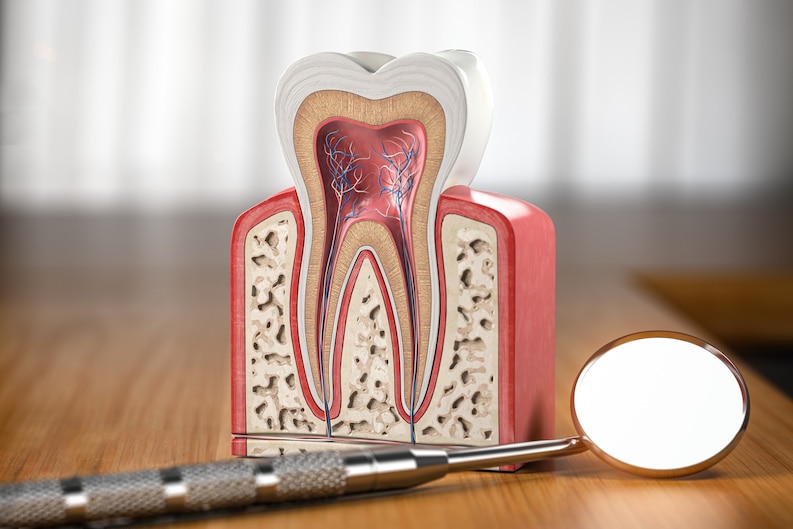Root Canal
Treatments

Root canal treatment saves teeth by removing infected pulp, disinfecting canals, and sealing them to prevent reinfection. Dental crowns restore function.
What is a Root Canal Treatment?
Root canal treatment, also known as endodontic therapy, is a dental procedure performed to save a severely damaged or infected tooth.
During this procedure, the dentist removes the infected pulp from the tooth, cleans and disinfects the root canals, and seals them to prevent further infection.
Root canal treatment is essential for preserving the natural tooth and preventing the need for extraction. Common signs that indicate the need for a root canal include severe tooth pain, sensitivity to hot or cold temperatures, swelling, and abscess formation.
The procedure is typically performed under local anesthesia, ensuring a comfortable experience for the patient. After the root canal, a dental crown is often placed on the treated tooth to provide added strength and protection. Root canal treatment has a high success rate and allows patients to retain their natural teeth, maintaining proper chewing function and preserving the surrounding bone structure.
The Root Canal Process
Anesthesia: The dentist administers local anesthesia to ensure a painless experience during the procedure.
Access: They create a small opening to reach the tooth's pulp chamber and gain access to the infected pulp.
Removal: The infected pulp is carefully removed from the pulp chamber and the root canals.
Cleaning and Disinfection: The root canals are thoroughly cleaned and disinfected to eliminate any remaining bacteria.
Shaping: The dentist shapes the root canals to prepare them for filling and to ensure a proper seal.
Filling: A biocompatible material called gutta-percha is used to fill the cleaned and shaped root canals, preventing reinfection.
Temporary Filling: In some cases, a temporary filling may be placed to protect the tooth between appointments.
Restoration: To restore the tooth's strength and function, a dental crown is often placed over the treated tooth.
Follow-up: Regular follow-up appointments are necessary to monitor the healing process and ensure the success of the root canal treatment.
Benefits of Root Canal Treatment
Tooth Preservation: Root canal treatments save severely damaged teeth from extraction, preserving natural teeth and maintaining oral function.
Pain Relief : By removing infected pulp and eliminating the source of toothache, root canal treatments provide effective pain relief.
Infection Eradication: The procedure thoroughly cleans and disinfects the root canals, eliminating bacterial infection and preventing its spread.
Aesthetics: Root canal-treated teeth can be restored with dental crowns, improving both function and aesthetics.
Long-Term Solution: Root canal treatments have a high success rate and can provide long-lasting results, avoiding the need for more extensive dental interventions.
Faq
Why Should I Get Implants?
Lorem ipsum dolor sit amet, consectetur adipisicing elit. Optio, neque qui velit. Magni dolorum quidem ipsam eligendi, totam, facilis laudantium cum accusamus ullam voluptatibus commodi numquam, error, est. Ea, consequatur.
Why Should I Get Implants?
Lorem ipsum dolor sit amet, consectetur adipisicing elit. Optio, neque qui velit. Magni dolorum quidem ipsam eligendi, totam, facilis laudantium cum accusamus ullam voluptatibus commodi numquam, error, est. Ea, consequatur.
Why Should I Get Implants?
Lorem ipsum dolor sit amet, consectetur adipisicing elit. Optio, neque qui velit. Magni dolorum quidem ipsam eligendi, totam, facilis laudantium cum accusamus ullam voluptatibus commodi numquam, error, est. Ea, consequatur.

